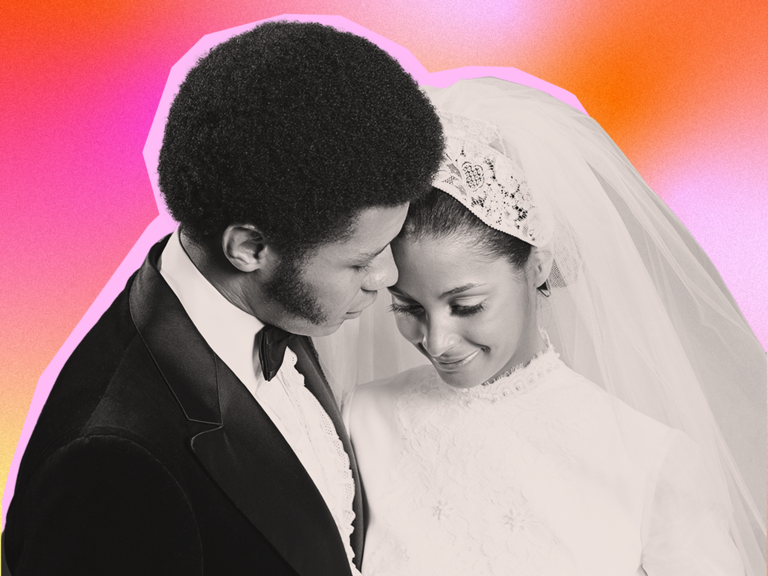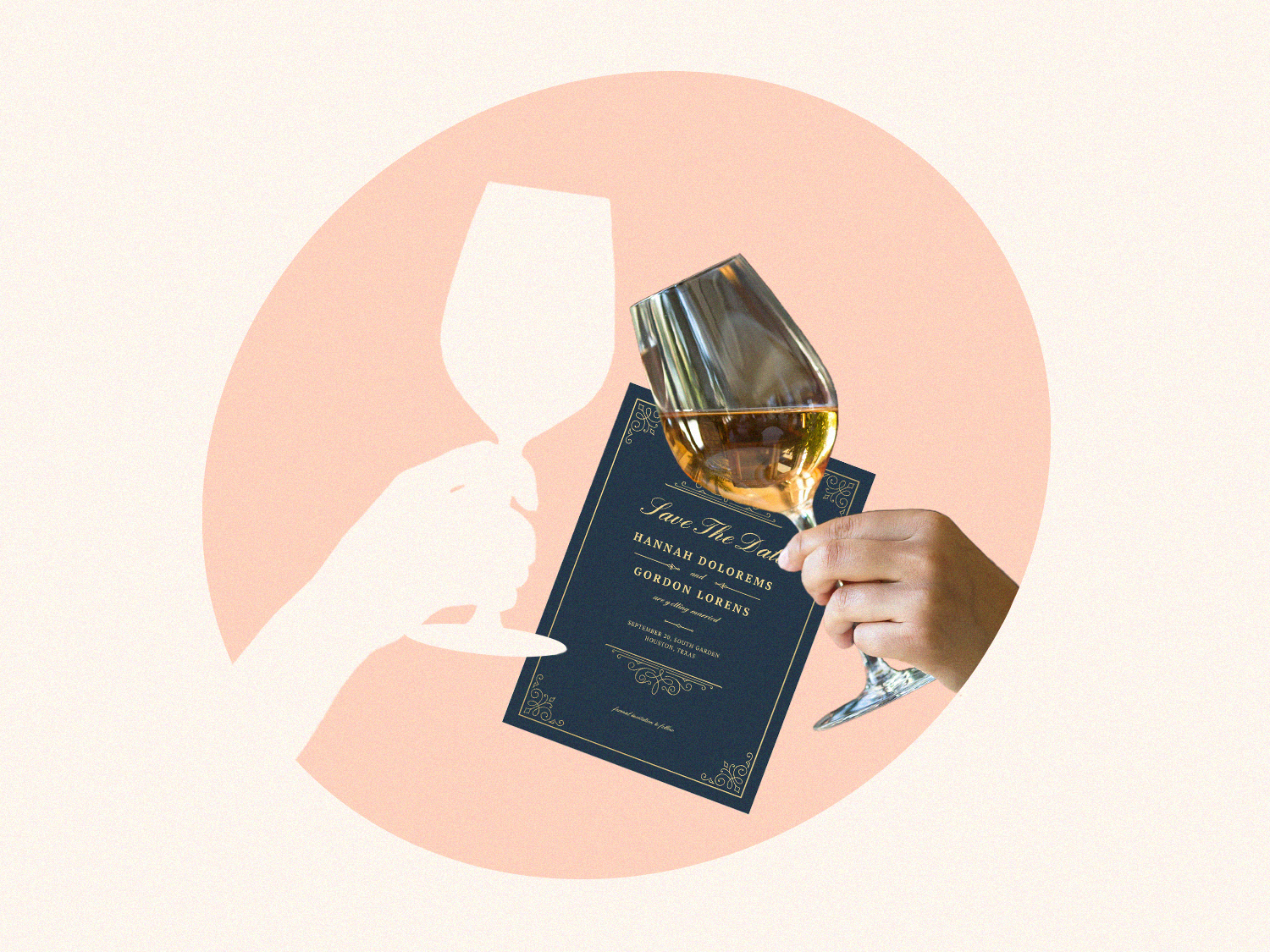18 Old-School Wedding Etiquette Rules You Don't Need to Follow

Whether you're newly engaged or in the thick of planning, you've probably heard the phrase "wedding etiquette" tossed around quite a lot. But is that exactly? Well, basically, it's a set of rules, but as times (and weddings) have changed many of these so-called rules are meant to be broken. Now, we're not recommending you throw the entire rulebook out the window since wedding planning etiquette does serve a purpose: A mutual respect between the to-be-weds and the guests. But remember, a big part of proper wedding etiquette is simply being aware of the conventional rules, regardless of whether you choose to follow them or not. With the help of wedding experts, we outline old-fashioned etiquette you can live without and the top rules that aren't going anywhere.
In this article:
Outdated Wedding Etiquette Rules to Ditch
Planning your union can be overwhelming at times, so there's no point in following long lists of wedding rules that'll add to the stress. Below are 18 etiquette tips you can leave at the altar and not feel guilty about.

1. Only Start Wedding Planning After Getting Engaged
Traditional wedding etiquette dictates that a couple can only start wedding planning after the proposal and that taking on any planning tasks beforehand is a no-no. Well, times have definitely changed. With wedding venues and vendors in high demand, couples are booking their must-have pros before the question has been popped.
From the Expert: "Planning a wedding before you get engaged traditionally used to be frowned upon," Irene Katzias, passionate lead planner and founder at Irene + Co Events, says. "However, I see couples book their dream venue two to three years in advance without being engaged yet. They know it's coming, there's been lots of discussions of the future and they know it's going to happen. If you have your heart set on a venue or specific date, and that's a nonnegotiable for you, why wait?"
2. The Bride's Parents Pay for the Wedding
It's true the majority of weddings are paid for by the bride's parents (according to The Knot Real Weddings Study), but today, the bride's family isn't expected to foot the whole bill. Now more than ever, couples fund their celebration in different ways. Grooms' parents and the couples themselves chip in nearly as often as brides' parents do. Many couples split costs evenly with both sets of parents or even pay for the entire thing themselves. It all depends on you two and your families' financial situations and preferences. Want to know what other couples are paying in your area? Use The Knot Budget Advisor to get the key insight every to-be-wed should have.
From the Expert: "The roots of the bride's side financing the wedding go all the way back to when families would transfer a dowry to the groom," Katzias explains. "Obviously, the dowry situation is pretty outdated–and as such, the financial responsibility being solely loaded onto the bride's family is outdated, too. Nowadays, I notice that couples are usually the ones in charge of handling the financial side of the wedding. While I do see many family members who contribute in some way, it's usually couples who have saved up to fund their ideal wedding day."
3. The Bride's Father Walks Her Down the Aisle
While having the father of the bride walk his daughter down the aisle during the processional is a common wedding tradition, it certainly doesn't work for everyone, depending on your relationship with your parents—and can actually feel pretty dated. So if you want to switch things up, don't be afraid to make this tradition a mother-of-the-bride duty.
From the Expert: "Traditionally, a father walking his daughter down the aisle was part of the giving away process, often symbolizing the daughter leaving her family home," says Sheavonne Harris, planning expert for 20 years and founder of Events by Sheavonne. "Today, many brides are frowning at the thought of being 'given away', and are choosing to walk down the aisle alone. Couples who have chosen to do a first look also want to walk down the aisle together, or each partner might have both of their parents or other loved ones escort them."
4. You Must Have a Wedding Party
Say it louder for the people in the back: You don't need to have a wedding party if you don't want one. While some couples are still having large wedding parties, others are avoiding the tradition altogether. Remember, it's not poor wedding manners to skip the whole wedding party thing—there are other ways to honor loved ones on your wedding day.
From the Expert: "So many of our clients decide to forego the traditional wedding party for all sorts of reasons," Claire Durán, planning specialist and president of Claire Durán Weddings & Events, says. "Some do it because they're at a different life stage where it may seem a bit 'childish' to be doing so, others do it because they have too many meaningful relationships and they might be getting into a conflict and/or dramatic situation if they had to choose a finite number of friends. Others do it so their friends can avoid the financial burden that comes with the position."
5. The Wedding Party is Divided by Gender
Gone are the days of bridesmaids and groomsmen being the only options for wedding party roles. Couples are now creating gender-inclusive titles (and etiquette) for all members of their wedding party, from bridespeople and groomspeople to wedding squads and friends of honor, and not focusing on specific sides.
From the Expert: "It's all about choosing the people who love you authentically and want to support you," Katzias says.
6. Your Parents' Names Are on the Invitations
If your parents are paying for a majority of the wedding, proper invitation wording etiquette still stands—their names should appear on the invites. But if the couple is shouldering the financial burden, their parents' names don't need to be included.
From the Expert: "Couples are making it known from the start that this is no longer their parents' event," Harris says. "It's their wedding their way, starting with the invitation. Traditionally, this was a way to recognize the parents as the host, but couples are taking complete control of the hosting duties."
7. Each Guest Has a Plus-One
If you want and can afford to give all of your guests plus-ones, go for it. However, once you've invited all guests who must be considered package deals (such as spouses, engaged people and couples who live together or have been dating seriously for a year or more), you aren't obligated to offer other single guests dates. The only exceptions to this rule are members of your wedding party and single guests who are coming from far away or really won't know anyone there.
From the Expert: "The 'plus one' topic can be very tricky," says Katzias. "Traditional wedding etiquette clearly allows for this, stating that everyone should have the option to invite a plus one. But for those planning their weddings, they realize that option can get very expensive very quickly. I usually tell my couples to invite those they love and want to see there. When sending out invitations, I recommend addressing everyone by their full name so there's no room for confusion about who's invited."
8. Asking for Cash Gifts Is a No-No
This is one of the many old-school rules of wedding planning we couldn't be more excited to rewrite. Requesting cash contributions instead of, or in addition to, traditional presents is not only acceptable but hugely popular among today's couples. Thanks to The Knot Cash Fund, couples can ask for cash to put toward experiences (maybe a trip to Thailand) and big life milestones (like buying a house). So while conventional retail registries aren't losing favor any time soon, there's definitely a new registry sheriff in town.
From the Expert: "Traditional wedding etiquette probably frowns on the idea of asking for a cash gift, but it's widely accepted now as modern practice," says Katzias. "It's normal, it's convenient and it's often the best gift for both the couple and the guest. In my opinion, everyone wins."
9. Adults-Only Weddings Are Rude
An adults-only wedding is completely acceptable, and it's your prerogative to go that route if you prefer it. Leaving the kids at home will make for a sophisticated affair and can really help you trim down the guest list. Just ensure you handle the "no kids" request tactfully so no one's offended (even though one person will still be).
From the Expert: All of our experts agreed—you can absolutely choose not to invite kids to your wedding, or you can invite only those in the wedding party (such as your niece, who'll be the flower girl).
10. Only the Bridesmaids Host the Bridal Shower
Traditionally, it was considered gift-grabbing if members of the bride's immediate family, like her mom, planned and hosted the shower, which is why you'd often see the maid of honor, entire wedding party, a family friend or the in-laws commonly host. But that's not really a thing anymore. Really, it comes down to who wants to throw the shower—the bride's aunts, in-laws, family friends, college roommates or even coworkers—as well as who lives where. And showers aren't just for brides—couple's showers are growing in popularity.
From the Expert: "I honestly think that whomever wants to throw a shower should do so," Durán says. "This event can go from something very simple to something incredibly intricate. Whoever wants to host can do whatever their means permit, and the celebrated spouse-to-be should only be grateful for whatever celebration is done in their name."
11. Guests Must "Cover Their Plate" With Their Wedding Gift
We've said it before and we'll say it again: Guests aren't "required" to give a gift of any particular value to cover the cost of their attendance at the wedding. In fact, according to wedding guest etiquette, guests aren't technically required to give a gift at all. So cast this tired "cover your plate" rule aside ASAP.
From the Expert: "When you gift anything, it's important to give what you can afford and what's appropriate for your relationship with the couple," Katzias says. "I often see couples deciding to offer gifts to a charity instead of accepting gifts to take the pressure off the guests."
12. Only Wedding Party Members Are Invited to the Bach Party
The only wedding etiquette rule you have to follow at your prewedding bash is that anyone invited to it must also be invited to the wedding. After that, go wild.
From the Expert: "Figuring out who's included in your wedding party is so complicated it can feel political," Katzias says. "Maybe you must have your new sister-in-law, even though you guys don't get along as well. And maybe that means that your best friend from college can't be at the party because you've got a maximum number for each side. I say that when it comes to your bach party, you should invite everyone you want there—a wedding party or not. Invite your closest friends who support, love and cherish you because that's what it's all about."
13. You Can't Create a Registry If It's Not Your First Wedding
There is no wedding rule around not asking for gifts regardless if this is your first marriage or your fourth. And chances are, your guests will want to celebrate your marriage by giving you gifts, too.
From the Editor: Still feeling uncomfortable about it? Consider creating a honeymoon fund with The Knot instead. Remember, every couple's situation is unique and personal, which means however you want to express your love on your wedding day is your choice. If a second registry or honeymoon fund is something you want or need, go for it.
14. You Have to Use Traditional Wedding Vows
No wedding is one-size-fits-all, which means your vows shouldn't be either. "Love, cherish and obey," found in traditional vows, has historical backing, but that doesn't mean you have to include them in your ceremony.
From the Editor: Chuck the template and write promises that speak to your and your partner's relationship. This is the perfect time to compose the feminist vows our foremothers wanted us to have.
15. You Have to Toss Your Garter or Bouquet
Tossing your garter or bouquet is one tradition we couldn't wait to go out of style. But it's not just us. According to our internal study, only 31% of newlyweds threw their bouquet at their wedding, which is a 13% decline since 2019.
From the Editor: So instead of launching your precious bouquet that you love or making everyone sit through the uncomfortable moments of your partner "sexily" taking your garter off, just look into some fun alternatives please.
16. "You May Kiss the Bride" Has to Be Included
To give a more modern feel to their ceremonies, many couples are excluding the "you may now kiss the bride" wording. This is because the phrase can exclude people who don't label themselves as a bride and doesn't represent the couple as equals.
From the Editor: Take charge of how you do your first kiss as new spouses. Consider switching the script by asking your officiant to say "Now seal your love with a kiss" or "You may now kiss your one and only."
17. It's Bad Luck for the Couple to See Each Other Before the Wedding
Whoever said it's bad luck for couples to see each other before the wedding didn't understand how many sweet moments they were missing out on. The reason for this custom was so neither party could back out of an arranged marriage––how romantic.
From the Editor: We are all for couples getting ready with one another before the ceremony or doing one of the various "first touch" options to connect with your partner before saying "I do."
18. You Have to Carry the Bride Over the Threshold
Similar to other customs on our list, the carrying the bride over the threshold tradition has misogynistic and unsavory roots (to say the least). That's why it's no surprise newlyweds are cutting this custom out of their postwedding rituals.
From the Editor: Instead of continuing a tradition that stems from a bride not wanting to be married to her partner, consider creating your own unique act that symbolizes you and your spouse starting a new (consensual) chapter together.
The Non-Negotiable Traditional Wedding Etiquette Rules
Sure, there are quite a few wedding guidelines that can be broken these days, but there are others that are here to stay. Below are the wedding rules we're not willing to budge on (and for good reason).

1. Be On Time
This is a biggie. We know emergencies happen, but if at all possible, do your best to be on time (if not early) to all of your wedding-related events. Your guests will appreciate things running as close to schedule as possible.
2. Be Kind to Your Wedding Vendors
Your vendors should be treated with respect before, during and after your wedding day. Those present during your event should receive a hot meal and be thanked for their services (more on that in a minute).
3. Focus on Your Guests' Comfort
While there's a lot of traditional wedding etiquette your loved ones will need to adhere to, you'll want to ensure that your crew's experience is as enjoyable and stress-free as possible. In particular, out-of-town guests should receive special attention, from creating a wedding website so you can provide all the information they'll need to gifting welcome bags upon their arrival.
4. Show Gratitude
From writing thank-you notes to your guests within three months of the wedding (yes, that's still a thing) to tipping your wedding vendors (and writing reviews), having an attitude of gratitude is an absolute must and proper wedding etiquette.























